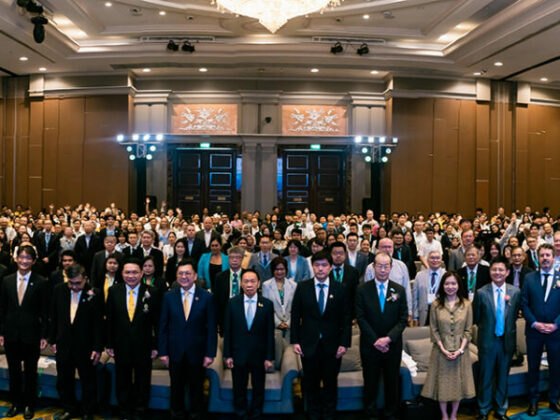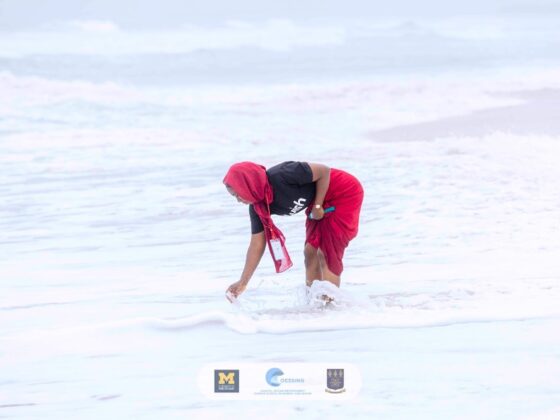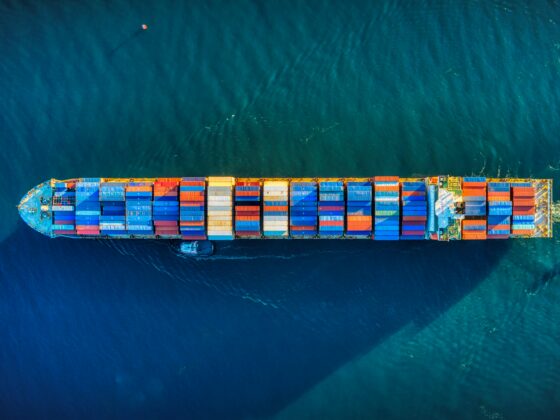Maintaining the balance of the Earth’s climate systems, the ocean is responsible for absorbing as much as 30% of human-produced carbon dioxide (CO2). Within the framework of the United Nations Decade of Ocean Science for Sustainable Development 2021-2030 (the ‘Ocean Decade’), Challenge 5: “Unlock Ocean-based Solutions to Climate Change” emerges as a pivotal initiative to better understand the complex relationship between the ocean and climate dynamics across all geographical regions and scales.
Today, no part of the ocean has completely escaped the impact of increased global warming, ocean acidification, and increased deoxygenation – together commonly referred to as climate change’s ‘deadly trio’. In fact, without the ocean, atmospheric CO2 would be close to double the preindustrial value and warming would be well over the 2°C goal set by the global community, with severe consequences on marine ecosystems, coastal erosion and climate-related events affecting communities globally.
Urgent and concerted global action is imperative to mitigate these impacts and preserve the health of the ocean and the planet. The integration of innovative ocean-based solutions, such as offshore wind energy and sustainable aquaculture, is becoming crucial in reducing carbon emissions and fostering a more resilient marine environment.
Ocean Decade Challenge 5 focuses on providing solutions to mitigate, adapt to, and build resilience against the effects of climate change. This initiative aims to increase our understanding of the ocean-climate nexus, generating knowledge and solutions through maintaining and enhancing sustained ocean observations and modeling. Its goal is to reach improved services, including predictions for the ocean, climate, and weather, for a more sustainable and adaptive future by 2030.
As part of the Ocean Decade Vision 2030, Working Group 5 has been established to guide Challenge 5’s momentum and draft its strategic ambition. It is led by co-chairs Dr. Carol Robinson, Professor of Marine Sciences at the University of East Anglia, UK, and Dr. Christopher Sabine, Professor of Oceanography at the University of Hawai‘i at Mānoa, USA. It comprises 16 other expert members from diverse fields ranging from law, ecology, fisheries, risk and resilience, and climate change. They seek to provide essential data, knowledge, infrastructure, personnel capacity, governance frameworks, and societal engagement to facilitate mitigation, adaptation, and resilience-building efforts against climate change’s impacts on ocean systems.
Co-chairs Christopher Sabine and Carol Robinson are leading experts in carbon cycling and oceanography. Sabine’s research focuses on understanding the global carbon cycle, the role of the ocean in absorbing CO2, and ocean acidification. Robinson specializes in microbial oceanography, particularly in marine carbon and oxygen cycling, and advocates for international collaborative research, mentoring of Early Career Ocean Professionals (ECOPs), and societal engagement in ocean policy.


Robinson underscored the significance of the Vision 2030 process in strengthening the ocean-climate nexus: “The relevance of the Vision 2030 process and this Working Group in particular is to stimulate a collaborative global effort to reduce emissions and develop and evaluate ocean-based approaches to mitigate, and sustainably adapt to unavoidable climate change.”
Success for Challenge 5 by the end of the Ocean Decade relies on filling key gaps in science and knowledge, understanding user needs, and exploring effective co-design strategies. “This includes achieving improved climate predictions and modeling capabilities, enhanced ocean observations, accessible knowledge and data, widespread understanding of the ocean’s role in climate regulation, and increased climate-smart investments in ocean and nature-based solutions,” explained Sabine.
To prevent global temperatures from rising by more than 1.5˚C, concerted and proactive efforts to dramatically reduce the burning of fossil fuels, while equipping societies to adapt to and be resilient to unavoidable levels of climate change, are required.
However, despite significant progress, the ocean community often finds itself facing barriers including limited resources, technological constraints, and the need for greater international cooperation. To overcome these obstacles, we need to consolidate our efforts globally and collaborate, prioritizing the needs of diverse stakeholders – from governments and industries to scientists and local communities – all seeking open access to data, practical tools, and innovative solutions.
To address Challenge 5, the Working Group encourages collaborative platforms, emphasizing the importance of comprehensive oceanographic and climate data, Indigenous knowledge, and infrastructure development. They recommend forging and strengthening partnerships, securing resources, building capacity, developing technology, and integrating with other Ocean Decade Challenges.
The Ocean Decade transformative journey to 2030
The consolidated version of the Challenge 5 White Paper was presented and debated during ‘Session 1: Science and Solutions for a Clean, Healthy and Resilient Ocean’ at the 2024 Ocean Decade Conference in Barcelona, a pivotal event for the Vision 2030 process. The outcomes of discussions will feed into the final version of the documents that will be available soon.
Click here to meet Working Group 5 and find out more about the Vision 2030 process.
For more information, please contact:
Vision 2030 Team (vision2030@unesco.org)
***
About the Ocean Decade:
Proclaimed in 2017 by the United Nations General Assembly, the UN Decade of Ocean Science for Sustainable Development (2021-2030) (‘the Ocean Decade’) seeks to stimulate ocean science and knowledge generation to reverse the decline of the state of the ocean system and catalyse new opportunities for sustainable development of this massive marine ecosystem. The vision of the Ocean Decade is ‘the science we need for the ocean we want’. The Ocean Decade provides a convening framework for scientists and stakeholders from diverse sectors to develop the scientific knowledge and the partnerships needed to accelerate and harness advances in ocean science to achieve a better understanding of the ocean system, and deliver science-based solutions to achieve the 2030 Agenda. The UN General Assembly mandated UNESCO’s Intergovernmental Oceanographic Commission (IOC) to coordinate the preparations and implementation of the Decade.
About the IOC/UNESCO:
The Intergovernmental Oceanographic Commission of UNESCO (IOC/UNESCO) promotes international cooperation in marine sciences to improve management of the ocean, coasts and marine resources. The IOC enables its 150 Member States to work together by coordinating programmes in capacity development, ocean observations and services, ocean science and tsunami warning. The work of the IOC contributes to the mission of UNESCO to promote the advancement of science and its applications to develop knowledge and capacity, key to economic and social progress, the basis of peace and sustainable development.


